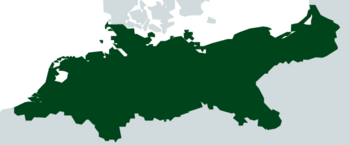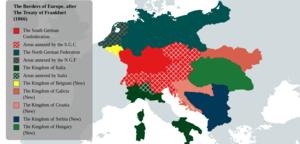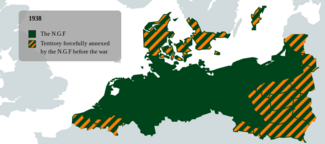North German Federation (Zwei Imperien)
This article is incomplete because it is pending further input from participants, or it is a work-in-progress by one author. Please comment on this article's talk page to share your input, comments and questions. Note: To contribute to this article, you may need to seek help from the author(s) of this page. |
The North German Federation Norddeutscher Bund | |
|---|---|
|
Flag | |
| Motto: "Vergessen Sie niemals unsere Sache" "Never forget our cause" | |
| Anthem: "Eine Ode an eine vergessene Sache" "An ode to a forgotten cause" | |
 | |
| Status | Sovereign state |
| Capital | Berlin |
| Largest city | Amsterdam |
| Official languages | German |
| Recognised regional languages | Czech,Dutch, Polish, Danish, and French |
| Ethnic groups (2023) | 55.5% Germans 20.4% Poles |
| Religion (2023) | 90.7% Christianity -82.63% Protestant |
| Demonym(s) | Pussian |
| Government | Federated parliamentary system semi-constitutional monarchy |
• Kaiser von Preußen | Wilhelm the VII |
• Grand Chancellor | Leon von Bismarck |
| Legislature | Die Legislative |
| Das Volksvertretung | |
| Nordreichstag | |
| Establishment | |
• North German Alliance | 19 August, 1866 |
• Formation of the Federation | 16 November 1869 |
• The War of Three Germanys | 2 August,1879 - 4 May,1882 |
| Area | |
• Total | 333,517 km2 (128,772 sq mi) |
| Population | |
• 2023 census | 62,335,485 |
• Density | 186.9/km2 (484.1/sq mi) |
| Currency | North German Mark (NG) |
| Calling code | +963 |
| Internet TLD | .ng |
The North German Federation (Norddeutscher Bund), also known as Prussia was at first initially a German military alliance established in August 1866 under the leadership of the Kingdom of Prussia. The Federation came into existence following a Joinet-Prussian/Bavarian victory againt the Austrian Empire in the War of The Three Germanys in 1866 which resulted in the Peace of Prague. Almost faced Total Destruction after the Franco-Prussian War, to animosity towards it's historical rivals Bavaria, Italia, and France, to an age of tense peace in europe, Two Great Wars and finally the modern day.
Terminology
History
Formation (1856-1867)
Austro-Prussian War (1856-1857)
Articles of Federation (1858)
The Articles of Federation were the founding documents of the North German Federation (N.G.F), established in 1862 after the victory of the N.G.F over the Austrian Empire in the War of Three Germanys. The Articles of Federation established the framework for the N.G.F's federal system of government, which included a centralized federal government with broad powers, as well as individual state governments.
The Articles of Federation established the Reichstag, a federal parliament consisting of representatives from each of the N.G.F's member states. The Reichstag was responsible for passing laws, approving budgets, and overseeing the work of the federal government. The Reichstag was presided over by a Chancellor, who was appointed by the President of the federation, and was responsible for leading the federal government.
The Articles of Federation also established the federal judiciary, with a Supreme Court responsible for interpreting federal law and resolving disputes between the federal government and the member states. The federal government was also responsible for foreign affairs, defense, and the regulation of interstate commerce.
War of Three Germanys (1861-1867)
The Aftermath of the War
The Franco-Prussian War (1870-1871)
Der kalte Krieg (1883-1913)
In the aftermath of the Franco-Prussian War,Napoleon III exiled Otto von Bismark from Prussia, and forced the establishment of a Catholic-led coalition government in the North German Federation (N.G.F), and with the betrayal of the South German Confederation and Italia. These tensions would play a major role in European Politics, With The two powers competing for influence over smaller European states, which led to the formation of new alliances and the realignment of power in the region. and both sides soon imposed trade barriers and economic sanctions on the other side in an attempt to gain an advantage over the other. Soon the division between North & South will forever end any hopes of Unification on both sides.
Kulturkampf Höhepunkt
By 1889 the Kulturkampf had reached it's climax as tensions erupted between the Catholics and the Protestants in the Country. With a worried group of Catholic Politicians lead by August Reichensperger, and his bother launched a Coup d'état against Wilhelm I in order to place a Catholic Monarch as " Kaiser von Preußen" (or "Emperor of Prussia" in English). Though the French, and the S.G.C supported this action, and tried to help the Coupists politically, the plotters where militarily defeated when the (Mostly Protestant) Army sided with Wilhelm I.
As a result of The Katholischer Putsch, The Sommerkrise 1879 begin which was a series of protests that later escalated into riots, which begin with Anti-Catholic & Catholic groups clashing as Anti-Catholic elements where later joined by Socialists elements before both groups turned against each other before the riots where put down by the order of Kaiser Wilhelm I.
The Großer Krieg
The North German Federation played a significant role in the First Großer Krieg (Great War), as they were the aggressors in the conflict. Seeking to assert their dominance over the region, they launched a surprise attack on the South Germans, catching them off guard and inflicting significant initial losses. Despite having superior industrial and economic resources, the North Germans faced a difficult challenge in the face of the South German Confederation's strong defenses and well-trained army. They suffered significant setbacks and were ultimately pushed back to their own borders by 1917.
The war had far-reaching consequences for the North German Federation, weakening their overall unity and position in the region. It also set the stage for further conflict and instability in the years to come. Overall, the First Großer Krieg was a devastating conflict that had a profound impact on both the North German Federation and the South German Confederation. It solidified the position of the latter as the dominant power in Central Europe, while weakening the former's standing in the region.
The Inter-War Period
North German Federation also underwent significant changes during the interwar period, as a result of the war's impact on its economy, politics, and society. The country may have also experienced a rise in nationalism and a desire for greater power and influence in the region.
Völkisch Prussia (1923-1938)
The Völkisch Party (Zwei Imperien) in Prussia pursued an policy of aggressive expansionism, seeking to reclaim Fame and Territory lost in the First Großer Krieg and to establish dominance over neighboring countries.
Völkiscm
Völkicsm is a far-right, totalitarian, Ultra-Ethno-nationalist Ideology is characterized by its Support of German Unification. Völkiscm advocate the domination of the Germans over the world and the construction of a "Grand-Germanic state" bringing together all the [[Germanic populations, and called for the implementation of Germanic Christianity. Völkism is interested in the history and roots of Germany and Germans. They believed in the purity of the Germanic "race" and relied on anthropology and philology to support this belief. Völkicsm is fiercely Anti-Catholic,Anti-Semitic, and Anti-communist.
The Second Großer Krieg (1939-1944)
The Second Großer Krieg (1939-1945) was a major conflict that involved the North German Federation (N.G.F) and the South German Confederation (S.G.C), as well as other European powers. At the start of the war, the S.G.C was initially overrun by the N.G.F and its allies, leading to a quick victory for the N.G.F. However, the S.G.C was not defeated completely, and a long and bloody guerrilla war ensued in the occupied territories. As the war progressed, the S.G.C received military aid from other European powers, including Italy and Hungary. This support enabled the S.G.C to mount a counter-offensive against the N.G.F, and by 1943, the S.G.C had regained most of its territory. The war continued to rage on, with both sides suffering heavy losses and engaging in brutal tactics. However, by 1945, the N.G.F was on the brink of defeat, and in April of that year, it surrendered to the S.G.C and its allies. The Second Großer Krieg had a devastating impact on Europe, leading to the deaths of millions of people and the destruction of entire cities. It also led to significant political changes in the region
Aftermath of WW2 & the Cold War
The aftermath of the Second Großer Krieg was a time of great upheaval and change for the North German Federation (N.G.F). The defeat in the war and the loss of territory to the South German Confederation (S.G.C) had a profound impact on the country and its people. The N.G.F was forced to cede significant portions of its territory to the S.G.C, resulting in a loss of economic and political power.
In the years that followed the war, the N.G.F underwent a period of rebuilding and reconstruction. The country invested heavily in its infrastructure and industrial capacity, with the goal of regaining its economic strength and improving the lives of its citizens. The government also implemented a series of social welfare programs and reforms aimed at promoting greater equality and addressing the needs of the working class During the Cold War, the N.G.F also underwent significant political changes. Even after the war a Milltary biuld up was ordered. This was done in the name of national security, with the government claiming that greater control and oversight was necessary to prevent the infiltration of communist elements into the country.
The Cold War era also saw the development of a significant military-industrial complex in the N.G.F, with the country investing heavily in its military and defense industry. This led to a proliferation of weapons and technology, and the N.G.F became one of the world's leading arms producers.
Post Cold War Era
The post-Cold War era was also marked by significant changes in the country's military and defense policy. With the threat of a Soviet invasion no longer a concern, the N.G.F began to shift its focus towards peacekeeping and humanitarian missions. The country became a leading contributor to international peacekeeping operations, and worked to promote greater cooperation and understanding between nations.
The post-Cold War period was also characterized by a renewed focus on economic growth and integration with the rest of Europe. The country played an active role in the creation of the European Union (EU), and became one of its founding members in 1993. The EU provided a framework for increased trade and investment, as well as greater political cooperation and coordination among member states.
In recent years, the N.G.F has continued to play an active role in shaping the future of Europe. The country has worked to promote economic growth and development, while also addressing pressing issues such as climate change and migration. Despite the challenges that lie ahead, the N.G.F remains a vibrant and dynamic member of the global community, committed to promoting peace, prosperity, and progress both at home and abroad.




